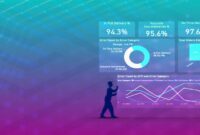Predictive Analytics: Anticipating Business Trends Before They Happen – Predictive Analytics Anticipating Business Trends Before They Happen opens the door to understanding how organizations can leverage data to foresee market shifts and consumer behavior. In an era where rapid changes are the norm, the ability to predict future trends is not just an advantage; it’s essential for staying relevant. By analyzing historical data, businesses can make informed decisions that drive growth and innovation, allowing them to adapt proactively rather than reactively.
This exploration into predictive analytics uncovers its significance in various sectors, highlighting key techniques and tools that enhance decision-making processes. From recognizing patterns in consumer data to assessing potential risks, predictive analytics serves as a compass for navigating the complexities of modern business landscapes.
In today’s fast-paced world, where technology is advancing at an unprecedented rate, the importance of digital literacy cannot be overstated. Digital literacy goes beyond just the ability to use a computer or navigate the internet; it encompasses a wide range of skills including the understanding of how to responsibly consume digital content, create digital products, and communicate effectively in a digital environment.
As we delve deeper into this topic, we will explore the various facets of digital literacy, its significance in our daily lives, and how it shapes our interactions in an increasingly connected world.To begin with, digital literacy is crucial in both personal and professional spheres. In our personal lives, being digitally literate allows individuals to access vital information, stay connected with friends and family, and engage with a broader community.
In a professional context, digital literacy can often mean the difference between career advancement and stagnation. Many employers now expect their employees to have a solid understanding of various digital tools and platforms—ranging from basic software applications to advanced data analysis tools. Moreover, the rise of social media has added another layer to digital literacy. Understanding how to navigate these platforms responsibly is essential, as they play a significant role in shaping public opinion and influencing societal norms.
Digital literacy empowers individuals to discern credible information from misinformation, promoting a more informed populace. It fosters critical thinking skills, which are imperative in today’s information-saturated environment where fake news and misleading content are rampant.Furthermore, digital literacy is closely tied to the concept of digital citizenship. This term refers to the responsible use of technology by individuals in society. Being a good digital citizen means understanding the ethical considerations of online behavior, respecting copyright laws, and being aware of one’s digital footprint.

It also involves recognizing the importance of privacy and security in the digital realm. With the increasing prevalence of cyber threats and data breaches, being digitally literate includes knowing how to protect personal information online and recognizing the signs of potential online scams.Another essential aspect of digital literacy is the ability to create and share content. In the age of social media and user-generated content, having the skills to produce engaging and informative content is invaluable.
Whether it’s writing a blog post, creating a video, or designing an infographic, the ability to convey information effectively is a sought-after skill. This not only enhances personal branding but also opens up opportunities for collaboration and networking with others in similar fields.Educational institutions are starting to recognize the need for digital literacy in their curriculums. Many schools are integrating technology education into their courses, ensuring that students develop the necessary skills to thrive in a digital world.
This includes teaching students how to evaluate online sources, understand the basics of coding, and use various multimedia tools for presentations. By fostering an environment that prioritizes digital literacy, educators are preparing students not just for academic success, but for a successful career in the digital age.The challenges of digital literacy are not to be ignored, however. There is a significant digital divide that exists, particularly in underserved communities.
Access to technology and the internet is not uniform across different demographics, leading to disparities in digital literacy. Efforts must be made to bridge this gap by providing resources and training to those who may not have had the opportunity to develop these skills. Initiatives such as community workshops, online courses, and public access programs can play a vital role in democratizing digital literacy and ensuring that everyone has the chance to participate in the digital economy.In addition to addressing access issues, it is also essential to recognize that digital literacy is a lifelong learning journey.
Technology is constantly evolving, and individuals must be willing to adapt and learn new skills throughout their lives. This continuous learning mindset is vital for staying relevant in today’s job market. Many organizations offer professional development opportunities for employees to enhance their digital skills, demonstrating a commitment to fostering a culture of growth and adaptability.In conclusion, digital literacy is an essential skill set for navigating the complexities of modern life.
It encompasses a wide array of competencies that empower individuals to engage positively and effectively in both personal and professional contexts. As technology continues to advance and integrate into every aspect of our lives, the need for digital literacy will only grow. By prioritizing education and access around digital skills, we can create a more informed, engaged, and equitable society.
So whether you are a student, a professional, or simply looking to improve your digital skills for personal reasons, embracing digital literacy is key to thriving in today’s world.




